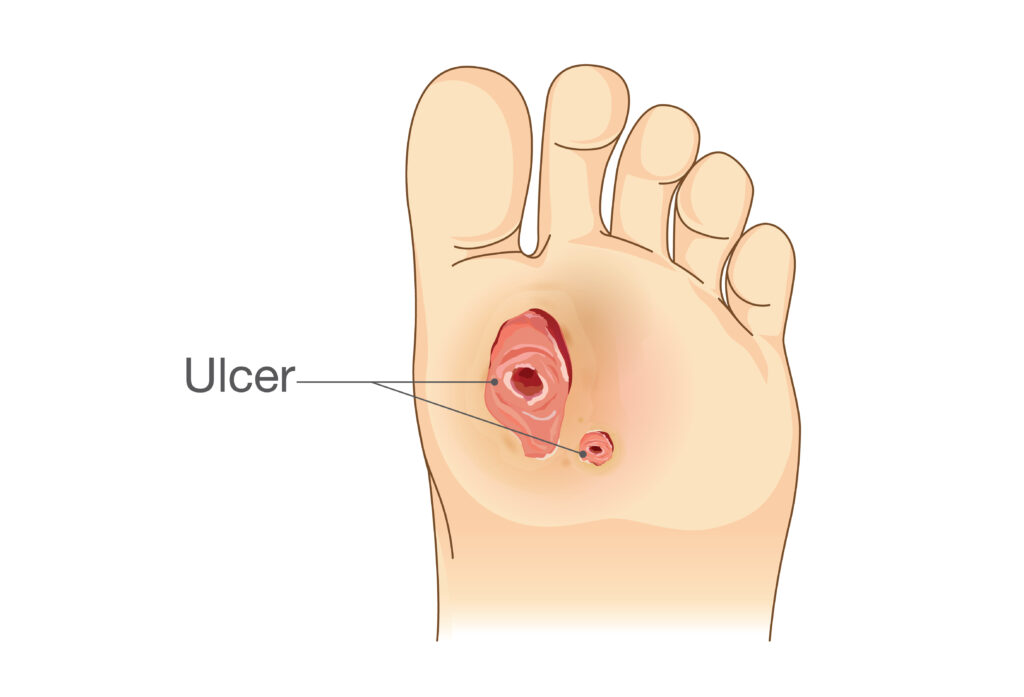Tips and Tricks for Managing Foot Ulcers
Foot ulcers are open sores that develop on the feet, usually due to underlying medical conditions like diabetes, poor circulation, or nerve damage. They can be quite significant as they are not just painful but can also lead to serious complications such as infections, cellulitis, or even bone infections. Proper care and treatment of foot ulcers are essential to prevent these complications and promote healing, making them an important aspect of managing overall foot health. Follow along as Red Mountain Footcare explains everything you need to know about managing and caring for your foot ulcers.
Understanding Foot Ulcers
Typically occurring on the lower extremities, foot ulcers are chronic wounds that are most commonly found on the plantar surface of the foot (the sole), over bony prominences such as the heel, ball of the foot, or toes. These ulcers result from a combination of factors, including reduced blood flow (ischemia), peripheral neuropathy, and excessive pressure or trauma, often associated with conditions like diabetes, peripheral artery disease (PAD), or venous insufficiency.
Causes of Foot Ulcers
 Foot ulcers can be attributed to various underlying causes, including diabetes, peripheral artery disease (PAD), and neuropathy. In individuals with diabetes, high blood sugar levels can
Foot ulcers can be attributed to various underlying causes, including diabetes, peripheral artery disease (PAD), and neuropathy. In individuals with diabetes, high blood sugar levels can
lead to nerve damage (neuropathy) and impaired blood flow (microvascular changes), making the feet more susceptible to ulcers. Peripheral artery disease, characterized by narrowed or blocked arteries, restricts blood flow to the extremities, hindering proper wound healing and increasing the risk of ulcers. Additionally, neuropathy disrupts the sensation of pain and pressure, making it difficult for individuals to detect injuries or excessive pressure that can result in ulcer formation.
Symptoms and Warning Signs
Typical symptoms of foot ulcers encompass persistent pain, localized redness, swelling, and sometimes the presence of fluid drainage. It is important to be vigilant for warning signs such as non-healing sores, which fail to show signs of improvement within a reasonable timeframe, and signs of infection such as increased pain, spreading redness, warmth, foul odor, or the presence of pus.
Prevention Strategies
To prevent foot ulcers, it is crucial to prioritize regular foot care, which includes daily inspection, cleansing, and moisturizing of the feet. Wearing proper footwear that provides adequate support and protection, as well as maintaining optimal blood sugar levels for individuals with diabetes, are also essential preventive measures. Additionally, regular check-ups with a healthcare professional are important to monitor foot health, identify potential risk factors, and address any concerns promptly.
Treatment Options
The treatment of foot ulcers involves a comprehensive approach that includes meticulous wound care, which may involve cleaning, debridement, and dressings tailored to promote healing. Infection control measures are crucial, and addressing underlying conditions such as diabetes or peripheral artery disease is essential. Additionally, advanced treatments such as hyperbaric oxygen therapy or growth factor treatments may be considered in certain cases to enhance the healing process and improve outcomes.
Supportive Care and Lifestyle Changes
Self-care measures play a vital role in the management of foot ulcers, as maintaining good hygiene, ensuring dryness of the feet, and avoiding excessive pressure or trauma can prevent further complications and promote healing. Adopting healthy lifestyle changes, including smoking cessation, regular exercise, and a balanced diet, is essential for overall foot health and to improve the body’s ability to heal ulcers. It is important to be aware of potential complications such as infection, cellulitis (skin infection), and even osteomyelitis (bone infection), and seek immediate medical attention if symptoms worsen, such as increasing pain, spreading redness, or the presence of a fever.
Foot Ulcer Treatment in Mesa, Arizona
Don’t let foot ulcers go unnoticed or untreated – take action today and reach out to our dedicated healthcare team at Red Mountain Footcare. Whether you have concerns about preventing foot ulcers, need guidance on wound care, or want to discuss treatment options, our experts are here to provide you with the specialized care and support you deserve. Don’t hesitate to contact us with any questions or to schedule an appointment – together, we can prioritize your foot health and ensure the best possible outcomes.
